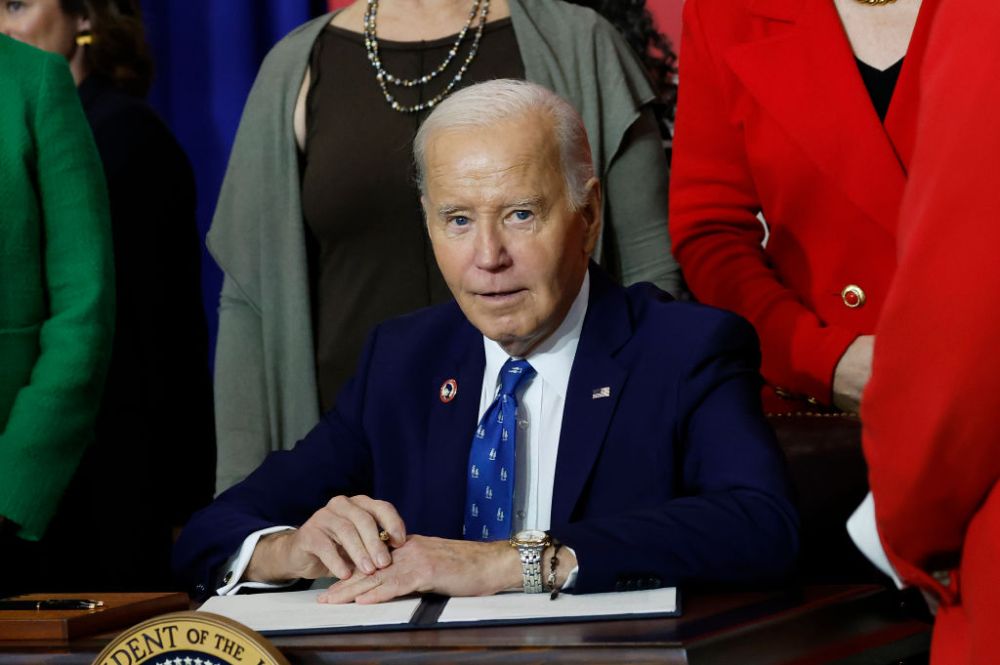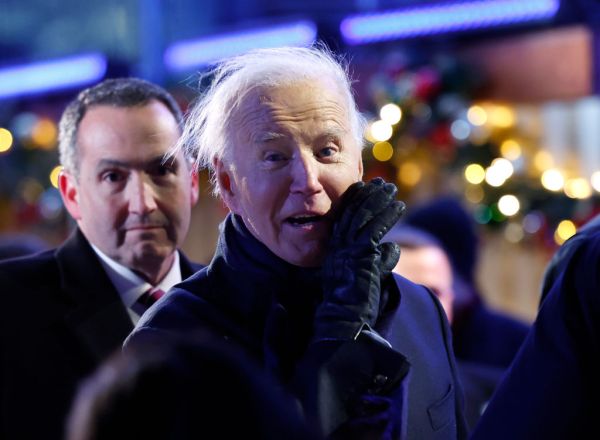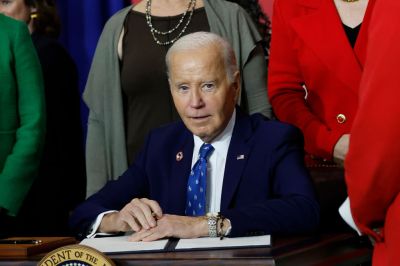For reasons I’ve explained before, it annoys me when partisan conservatives react to progressive overreach by saying, “This is how you got Trump.”
But as an empirical matter it is true that authoritarians profit from left-wing squeamishness about basic law enforcement. In 2019 David Frum warned Democrats that their immigration policies would be their downfall in a piece titled “If Liberals Won’t Enforce Borders, Fascists Will.” Five years later, that doubles as a one-line explanation for how we got Trump—again.
On Monday I woke up to find my Twitter feed dominated by two news items. One was a woman being burned to death in a subway car in New York City after another passenger intentionally set her on fire. (Don’t look up the story on social media or you’ll stumble across video of her in flames.) The suspect is an immigrant from Guatemala who appears to be in the U.S. illegally.
The other was Joe Biden deciding to commute the death sentences of almost, but not quite, every condemned killer in the federal prison system.
Of the 40 men waiting to be executed, 37 have had their sentences reduced to life in prison without the possibility of parole. The three exceptions are names you’ve heard before. One is Dzhokhar Tsarnaev, the surviving brother in the pair who carried out the Boston Marathon bombing in 2013. The second is Dylann Roof, the white supremacist who murdered nine black congregants at a South Carolina church in 2015. The third is Robert Bowers, the mass shooter who gunned down 11 people at the Tree of Life synagogue in Pittsburgh in 2018.
“President Biden has dedicated his career to reducing violent crime and ensuring a fair and effective justice system,” the White House said in a statement explaining the decision. “He believes that America must stop the use of the death penalty at the federal level, except in cases of terrorism and hate-motivated mass murder.”
Except?
There were two principled options before the president if he wanted to make the point that capital punishment should be used more sparingly than it is. One was commutations for everyone. If the death penalty is so dangerous and immoral as a form of state power that the federal government shouldn’t use it then there’s no reason to make exceptions. Spare Tsarnaev, Roof, and Bowers too and accept the blowback as the price of doing what you think is right.
The other was to go case-by-case through the 40 candidates and arrive at a thoughtful moral judgment about each, the least a president can do if he’s resolved to overturn a duly imposed death sentence. The circumstances of some killings might plausibly be more sympathetic than others. An unarmed getaway driver convicted of felony murder after his accomplices shot someone during a robbery, for instance, has a stronger argument for mercy than Ted Bundy. The death penalty should be reserved for the worst of the worst, Biden might have said.
That’s not what he did. Of the 37 men who received presidential clemency this morning, some amassed a body count during their time as drug dealers equal to or greater than that of Tsarnaev, Roof, or Bowers. One reprieved man killed a woman, kidnapped her 12-year-old daughter, then shot the girl four times and cut her throat before dumping her body in the woods. Another, Jorge Avila-Torrez, is a bona fide serial killer whose victims include two girls under the age of 10, both of whom he sexually assaulted before murdering them.
There’s no moral argument for sparing Avila-Torrez. What distinguishes him from the three men who didn’t receive clemency is politics: Tsarnaev, Roof, and Bowers are notorious while Avila-Torrez is not (although he will be soon!) and that made the political price of commuting their death sentences too steep for the White House, it seems. Functionally, Biden’s stance on capital punishment amounts to “always wrong—unless the convict is really, really well-known.”
How’s that for a bold moral stand?
Political damage.
It’s remarkable how much damage Biden has done to his party over the past month with ill-considered presidential clemency.
Pardoning his son was supremely selfish, especially after he assured the public that he wouldn’t do it, but today’s commutations also have a whiff of narcissism about them. Biden famously wrote the 1994 federal bill that broadened the class of crimes that might warrant death, yet over time that’s become less a feather in his cap than an albatross around his neck. In the 30 years since, support for capital punishment among Americans has narrowed from 80-16 in favor to 53-43, with only 38 percent of the president’s party now in favor.
Maybe Joe Biden has had an earnest change of heart over time, as so many other Americans have. But I think it’s just as likely that he’s in “legacy” mode as his career sputters to an end and he wants the majority of Democrats who now oppose capital punishment to have something to remember him fondly by on this issue. That’s good for him—but not so good for House and Senate Democrats, who’ll spend the week after Christmas fielding requests from reporters to kindly explain to the American people why Jorge Avila-Torrez’s life should be spared.
Biden has also done an injustice to worthy inmates in the federal prison system who are hoping for presidential mercy. The Justice Department routinely considers appeals for clemency and recommends candidates to the White House, but some applications have been sitting on the president’s desk without action for years, per the Washington Post. Neither the pardon of Hunter Biden nor the commutations granted last week to 1,500 convicts sentenced to home confinement during the pandemic were among those vetted by the DOJ. Now, indefensibly, Biden has let Avila-Torrez and dozens of other killers jump the line as well.
That’s a hallmark of his presidency. Those who followed proper procedure by repaying their student loans, waiting patiently for an immigration visa, or seeking presidential clemency through the Justice Department have been left to feel like suckers for following the rules as the Biden White House connives to make allowances for those who weren’t as conscientious.
Biden had better clear the decks of DOJ recommendations before he departs or else his legacy from this episode will be less a matter of having dealt a blow to the death penalty than having left far more worthy clemency applicants to languish. In fact, today’s commutations will probably doom him to political no-man’s land regardless insofar as he’s done too much to suit most of the public and not enough to suit anti-death penalty activists. “You can’t rank victims, Mr. President,” one complained to Newsweek after learning that Tsarnaev, Roof, and Bowers weren’t spared. “I am begging you to finish the job, not only with the three men left on federal death row, but also with those on the military death row. There’s still time. Finish the job.”
Worst of all for Biden, I suspect most of the country will treat the news about killers being spared the needle as an occasion to reflect not on the state of capital punishment but on the state of, well, him.
Last week, citing nearly 50 sources, the Wall Street Journal uncorked an exposé about the true extent of the president’s physical and cognitive diminishment. The White House hasn’t been hiding his decline for months, allegedly, it’s been hiding it for years. As far back as his first few months in office, aides were having to reschedule meetings on the fly because “he has good days and bad days, and today was a bad day.” In the span of about 18 months, his senescence has gone from being a semi-secret to an open secret to no longer a secret after June’s presidential debate to a scandalous cover-up revealed.
That’s probably the lens through which much of the public will view today’s acts of clemency. It wasn’t Joe Biden who decided to spare most of federal death row, many will assume, it was the liberal ideologues around him who are running the country in his cognitive absence. He just signed whatever paper they put in front of him. In that sense, the White House is right to believe that it did something important today to secure Biden’s “legacy” in the eyes of the American people. Just not in the way it thinks.
A gift to Trump.
Another remarkable thing about Biden’s pardon-palooza is that, between clemency for his son and clemency for murderers, he’s given Donald Trump the widest possible berth politically to misuse a presidential power that he had already begun to misuse in his first term.
One reason the pardon of Hunter Biden was so obnoxious is that it preemptively disarmed criticism of Trump’s forthcoming clemency for the January 6 rioters. Yes, true, as sleazy as Hunter is, he didn’t beat any cops or try to overthrow the government. But if Joe Biden can hand out “get out of jail free” cards to his cronies, why shouldn’t Trump be allowed to do the same? The moral case against dubious politically charged pardons grew weaker overnight.
After today it’ll be even harder for the public to muster any outrage next month. If a gutter degenerate like Jorge Avila-Torrez is worthy of presidential mercy, why aren’t the worst January 6 offenders, like Stewart Rhodes, who was convicted of seditious conspiracy? Not all clemency is created equal, I realize: Trump might set Rhodes entirely free rather than knock his sentence down a peg like Biden has done for Avila-Torrez. But at a gut moral level of “who deserves compassion from the state and who does not?” the comparison is withering. There’s no way to argue that Trump’s beneficiaries are less deserving than Biden’s.
Trump himself may have been a factor in the White House’s decision to clear out (most of) federal death row, in fact. Overlooked in the tumult of the 2020 election and its aftermath was the fact that his administration went on an execution spree in the final six months of his term, putting 13 condemned men to death after none had been executed for nearly 20 years. Trump being Trump, the timing seems more than coincidental. Presumably he was eager for some “law and order” publicity to impress wavering voters in the home stretch of the campaign and decided that killing a bunch of death-row inmates was one way to get it.
That might be the strongest defense of Biden’s action today, in fact. If you worry that Trump, upon returning to office, will be spoiling to execute a few convicts simply to make a point to Americans about “the sheriff” being back in town or whatever, you can understand why Biden and/or his liberal handlers would feel moved to short-circuit the attempt. Death sentences were destined to be politicized one way or another, either by Trump expediting them as a flex to show how tough he is or Biden commuting them to signal his opposition to (most) capital punishment. Biden chose to seize the opportunity.
But this too could backfire long-term. Having now seen a departing Democratic president remove dozens of inmates from death row, executing condemned prisoners expeditiously might now become a priority for Trump, his Republican successors in office, and Republican governors at the state level. If the politics of capital punishment are such that duly adjudicated death sentences will be carried out when the GOP is in charge or else not at all, the GOP will govern accordingly.
And American voters might view that as a feature of electing them, not a bug, particularly as anxiety about public disorder rises. If liberals won’t enforce borders, fascists will; if liberals won’t administer the needle to monsters like Jorge Avila-Torrez—well, you know.
What I dislike most about Biden’s act of clemency today, though, is that it’s authoritarian in nature.
It’s a funny kind of authoritarianism in that it’s a case of the president acting less ruthlessly than other branches of government, not more, but it’s authoritarian all the same. By overturning (nearly) all federal death sentences, the president has usurped Congress and the judiciary. The people’s representatives decided that certain crimes should be punished with death; jurors in dozens of cases decided that the defendants were guilty of those crimes and deserved the statutory punishment; and now here comes Joe Biden to say, “No, sorry.”
It’s in the nature of the pardon power for the president to substitute his own judgment for someone else’s, of course, but that power is typically used in individual cases. When an entire class of sentences is commuted for supposedly being unjust, the law as a whole has been undone by one man. If the chief executive refuses categorically to execute a particular statute then that statute functionally doesn’t exist. It’s been nullified by presidential fiat.
That’s not the way the Constitution works. And it’s not a precedent that Joe Biden should be setting with Donald J. Trump watching from the sidelines, taking notes.
End it or mend it.
“If there’s no serious movement to amend the president’s pardoning power after Biden, there never will be,” law professor Keith Whittington declared after news broke of the death-row reprieves this morning.
That’s the best possible spin one can put on what happened today, I think. Postliberal Republican voters aren’t about to mobilize anytime soon behind a constitutional amendment that would yank the pardon power out of Trump’s hands, especially after the Supreme Court handed Trump its own “get out of jail free” card when using it. But between the indefensible clemency doled out this month by Biden and the indefensible clemency Trump will begin doling out next month, maybe we can get a little bipartisan momentum going for a constitutional amendment circa 2029 that repeals the pardon power or limits it in some way.
Requiring Congress to ratify the president’s pardons would be one way to place a check on his authority. (What I wouldn’t give to see Senate Democrats forced to vote on Jorge Avila-Torrez’s commutation.) Or perhaps abolishing pardons during the presidential lame-duck period would suffice as a restraint.
But here, inevitably, we run into a Catch-22: A country that didn’t care enough to limit presidential power after a failed coup attempt a few years ago almost certainly won’t be roused to do so by a few noisome pardons here and there. A convicted felon just won the popular vote; if anything, Democrats are looking at last month’s election result and wondering if they need to be more demagogic, unscrupulous, and ruthless to demonstrate “strength” to voters.
Most Americans will be fine with a country where serial killers and seditionists are top candidates for clemency. Love it or leave it.







Please note that we at The Dispatch hold ourselves, our work, and our commenters to a higher standard than other places on the internet. We welcome comments that foster genuine debate or discussion—including comments critical of us or our work—but responses that include ad hominem attacks on fellow Dispatch members or are intended to stoke fear and anger may be moderated.
With your membership, you only have the ability to comment on The Morning Dispatch articles. Consider upgrading to join the conversation everywhere.